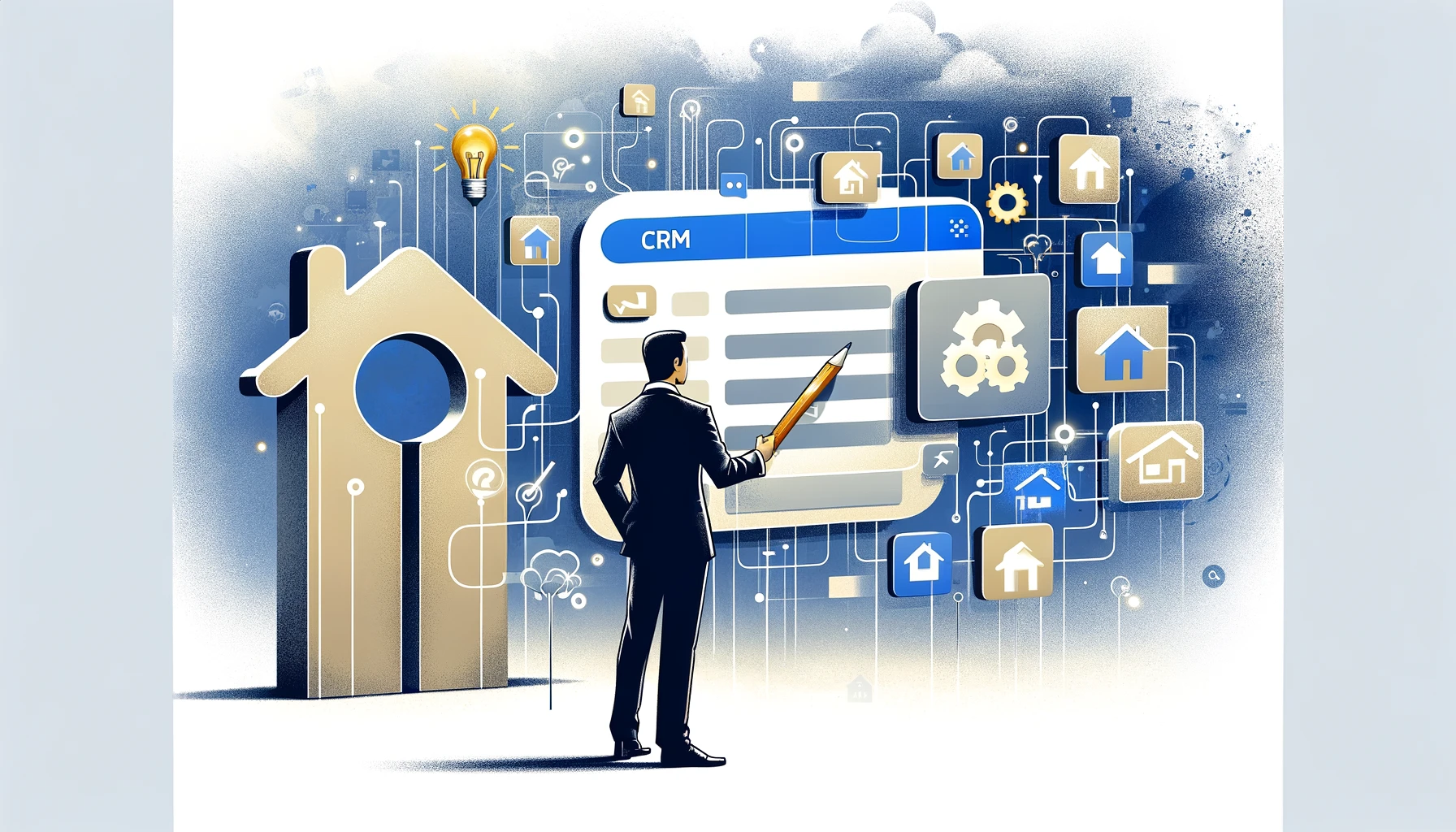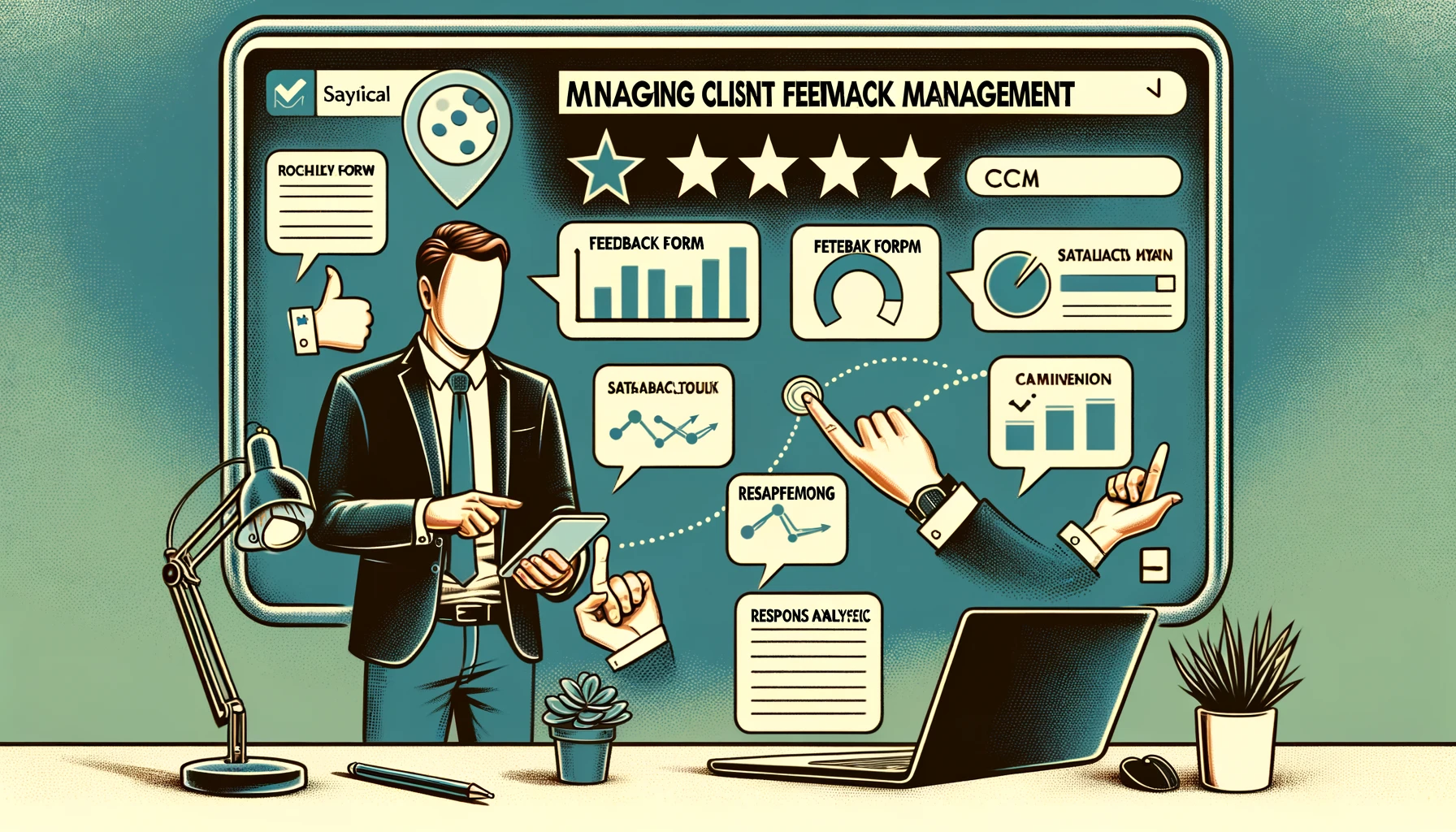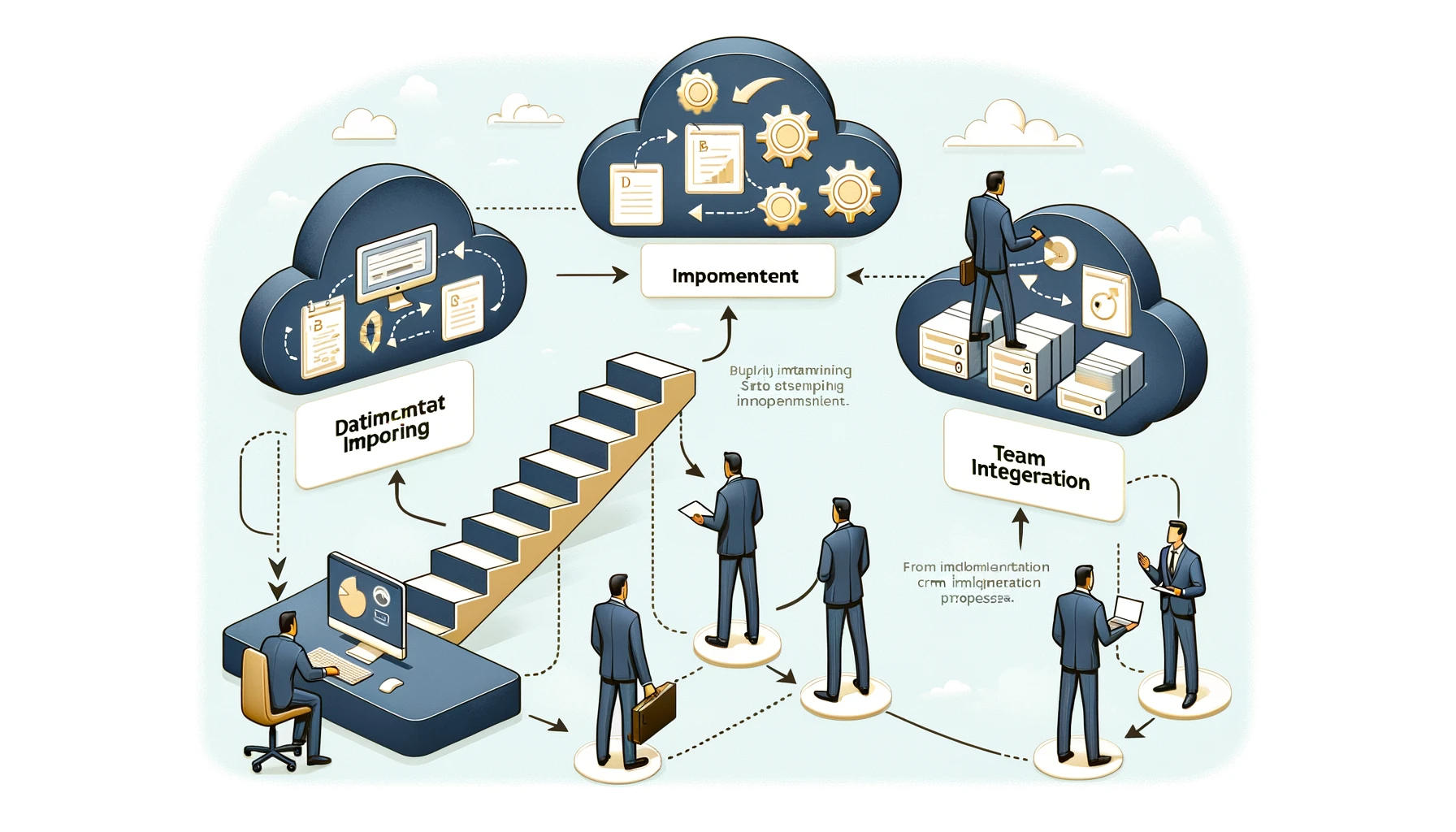CRM for Real Estate: Digital Property Management

Discover top CRM solutions tailored for real estate professionals. Enhance client relations, streamline sales, and boost efficiency. Explore now!.
Maximizing Efficiency: How CRM for Real Estate Streamlines Operations
In the fast-paced world of real estate, efficiency is paramount. With the introduction of CRM for real estate, property management has never been smoother. This powerful tool has been instrumental in streamlining operations, saving time and resources, and improving customer satisfaction.
For starters, CRM for real estate centralizes all data, enabling quick and easy access to vital information. This eliminates the need to sift through stacks of paperwork or multiple databases, thereby saving valuable time and reducing the risk of errors.

Moreover, CRM for real estate optimizes communication. With all client information and communication history at your fingertips, you can provide personalized service, foster stronger relationships, and ultimately, close deals faster.
The automation capabilities of CRM for real estate are truly game-changing. From scheduling appointments to sending reminders and follow-ups, these tasks can be automated, freeing up your time to focus on more critical aspects of your business.
Consider this:
- A CRM for real estate can automate email campaigns, keeping your prospects engaged.
- It can streamline lead management, ensuring no potential client slips through the cracks.
- It can provide real-time updates on property listings, keeping you and your clients in the loop.

Lastly, CRM for real estate provides insightful analytics. The ability to track and measure performance is crucial for any business. With CRM, you can monitor various metrics, identify trends, and make data-driven decisions.
Here’s a snapshot of the impact a CRM for real estate can have:
| Metric | Before Implementation | After Implementation | Improvement |
|---|---|---|---|
| Lead Conversion Rate (%) | 20 |
35 |
+75% |
| Customer Retention Rate (%) | 60 |
85 |
+41.7% |
| Average Response Time (minutes) | 30 |
10 |
-66.7% |
| Customer Satisfaction Score (out of 10) | 7 |
9 |
+28.6% |
Overall CRM for real estate is a powerful tool that can significantly streamline operations and maximize efficiency. By centralizing data, optimizing communication, automating tasks, and providing insightful analytics, it empowers real estate professionals to deliver superior service and achieve better results.
The Future of Property Management: Unpacking CRM for Real Estate
As we delve into the future of property management, it becomes evident that CRM for real estate is poised to play a critical role. With the digital revolution gaining momentum, these systems are set to take center stage, transforming the industry as we know it.
The heart of this transformation lies in the ability of CRM systems to integrate with other technologies. This interoperability provides a platform for the seamless exchange of data, facilitating more informed decision-making processes. For instance, integrating CRM with AI could enable predictive analysis of customer behavior, revolutionizing lead generation and nurturing strategies.

Furthermore, CRM for real estate is set to enhance customer experience significantly. As customer expectations evolve, so does the need for personalized and prompt service. This is where CRM shines, with its ability to store and analyze customer data to deliver tailored services.
The future also holds promise for CRM systems in terms of mobility. As the world becomes increasingly mobile, so does the need for real estate professionals to work on-the-go. Future CRM systems will likely be mobile-friendly, allowing agents to access vital data and perform tasks from anywhere, at any time.
Let’s break down some key ways CRM for real estate will shape the future:
- Enhanced interoperability with technologies like AI and IoT (Internet of Things)
- Improved customer experience through personalized service
- Increased mobility for real estate professionals

The potential of CRM for real estate is immense, and we’re just scratching the surface. As the technology evolves, it promises to bring about even more significant changes, redefining property management in ways we can only imagine.
| Trend | Potential Impact | Why it Matters |
|---|---|---|
| Integration with AI and IoT | Predictive analysis, improved automation |
Revolutionizes lead generation and nurturing |
| Enhanced Customer Experience | Personalized service, prompt response |
Meets evolving customer expectations |
| Increased Mobility | Access to data and tasks on-the-go |
Facilitates work for mobile professionals |
In the end, the future of property management is exciting, and CRM for real estate stands at the forefront of this revolution. As we move forward, embracing these systems will not merely be an option but a necessity for those seeking to stay ahead in the game.
CRM for Real Estate: A Game Changer in Client Relations
The impact of CRM systems on client relations in the real estate industry is undeniable. A game-changer, indeed. By centralizing client data, it allows for a more personalized and efficient approach to client management.
Imagine this: as a real estate professional, you have a prospective client interested in a specific type of property. Instead of sifting through piles of paperwork or multiple databases, you can instantly access this client’s profile on your CRM system. You can view their preferences, previous interactions, and even their response to past property recommendations. This level of detail facilitates a personalized approach, enhancing your client’s experience and increasing the likelihood of a successful deal.

Additionally, CRM systems can improve communication with clients. From sending automated reminders for appointments to providing updates on property listings, these tasks can be handled efficiently by the CRM. This not only saves time but also ensures consistent and timely communication, a key factor in building strong client relations.
Here are some ways a CRM system can enhance client relations:
- Personalized client approach based on detailed profiles
- Efficient and consistent communication
- Timely updates on property listings
A CRM system also aids in managing client feedback. By tracking client responses and feedback, real estate professionals can make necessary adjustments to their client management strategies. This responsiveness to client needs and preferences inevitably leads to higher client satisfaction rates.
Consider these potential improvements:
| Metric | Before Implementation | After Implementation | Improvement |
|---|---|---|---|
| Client Satisfaction Score (out of 10) | 7 |
9 |
+28.6% |
| Client Retention Rate (%) | 65 |
85 |
+30.8% |
In essence, a CRM system can revolutionize client relations in the real estate industry. By offering personalized service, improving communication, and being responsive to client feedback, real estate professionals can enhance client satisfaction and retention rates.

The future of client relations in real estate looks promising with the adoption of CRM systems. As the industry evolves, so does the need for efficient and personalized client management. And that’s precisely what a CRM system offers.
Getting Started: A Beginner’s Guide to CRM for Real Estate
Embarking on the journey of using CRM for real estate might seem daunting at first, but the process can be quite straightforward when broken down into manageable steps. So, let’s delve into this beginner-friendly guide to get you started!
First things first, understanding your needs is crucial. Every real estate business is unique, and so are its requirements. Some might need a robust system to handle a large volume of data, while others might require a more user-friendly interface for their small team. Identifying your needs will help you choose the right CRM system that fits your business model.
- Large volume of data: Robust CRM system
- Small team: User-friendly CRM system

Once you’ve identified your needs, the next step is to research and compare different CRM systems available in the market. Look for features like ease of use, integration capabilities, automation, and analytics. These features are the cornerstones of a good CRM system.
Next, consider your budget. While it’s important to invest in a good CRM system, it’s equally important to ensure it doesn’t burn a hole in your pocket. Look for a system that offers good value for money.
- Ease of use: Simplifies operation
- Integration: Seamless data exchange
- Automation: Reduces manual tasks
- Analytics: Provides insights for decision making

Once you’ve chosen a CRM system, it’s time to implement it. Start by importing your existing data into the new system. This could include client information, property listings, and past transactions. Make sure to clean up your data before importing to ensure accuracy.
The final step is training your team. A CRM system is only as good as the people using it. Ensure your team understands how to use the system effectively. Regular training sessions can help in this regard.
Remember, Rome wasn’t built in a day. Implementing a CRM system takes time and patience. But once you’ve got it up and running, the benefits are well worth it.
| Step | Why it’s Important |
|---|---|
| Identifying Needs | Helps choose the right CRM system |
| Research and Comparison | Ensures you get the best features |
| Budgeting | Ensures affordability |
| Importing Data | Seamless transition to the new system |
| Training | Ensures effective use of the system |

In the end, the journey of implementing a CRM for real estate might have its challenges, but it’s a journey worth embarking upon. By following these steps, you can ensure a smooth and successful CRM implementation. Happy CRM-ing!
Case Study: Real Estate Businesses Transforming with CRM
Let’s dive into a fascinating transformation journey that highlights the profound impact of CRM for real estate. This narrative revolves around a mid-sized real estate company that was struggling with scattered data, inefficient communication, and subpar client satisfaction rates.
The company was grappling with a disorganized system, where important client data was spread across different platforms. This made it difficult to retrieve information quickly, leading to delays and inefficiencies. The absence of a centralized system also led to communication gaps, resulting in missed opportunities and a poor client experience.

The introduction of a CRM system marked a turning point in the company’s operations. The CRM system centralized all client data, making it easily accessible. This significantly reduced the time spent on data retrieval and minimized errors.
Additionally, the CRM system streamlined communication. It provided a platform for consistent and timely interactions with clients, improving their experience and satisfaction. The company also leveraged the system’s automation capabilities to schedule appointments and send reminders, freeing up more time for strategic tasks.
The impact of the CRM system on the company’s operations was remarkable:
- Client data retrieval time was cut by 64%
- Communication efficiency improved by 71%
- Client satisfaction rates rose from 74% to 96%

The transformation of this real estate company underscores the power of a CRM system. By centralizing data, improving communication, and automating tasks, CRM for real estate can significantly enhance operational efficiency and client satisfaction. This case study serves as a testament to the transformative potential of CRM systems in the real estate industry.
CRM for Real Estate: Simplifying Business in the Digital Age
The digital age has brought about a wave of technological advancements, and CRM for real estate is one of them. This transformative tool is simplifying business operations unlike ever before. With a focus on data centralization, communication optimization, and task automation, CRM systems are reshaping the landscape of the real estate industry.
Data centralization is a key feature of CRM for real estate. It consolidates all necessary information into a single platform, reducing the time and effort associated with data retrieval. A real estate agent can swiftly access client profiles, property listings, transaction history, and more, all in one place. This not only enhances efficiency but also minimizes the risk of errors, leading to more accurate decision-making.

CRM systems also excel in communication management. Real estate professionals can track all client interactions, ensuring consistent and personalized communication. Automated email campaigns, appointment reminders, and follow-ups can keep clients engaged and informed, fostering stronger relationships.
Key benefits include:
- Centralized data for quick access
- Optimized communication for stronger client relationships
- Automated tasks for increased efficiency
Utilizing CRM for real estate also simplifies task management. Routine tasks such as scheduling, reminders, and follow-ups can be automated, freeing up valuable time for strategic tasks. This increased efficiency can lead to higher productivity and improved business performance.
Finally, CRM systems provide insightful analytics, facilitating data-driven decision making. Real estate professionals can track performance metrics, identify trends, and make strategic adjustments to their operations. This capability to leverage data for business growth is a game-changer in the industry.
To sum it up, CRM for real estate is simplifying business operations in the digital age. By centralizing data, optimizing communication, automating tasks, and providing insightful analytics, it’s a tool that’s revolutionizing the real estate industry, one property at a time.

FAQs
-
How Does CRM Benefit Real Estate Professionals? CRM (Customer Relationship Management) in real estate goes beyond basic client data storage. It helps realtors manage interactions, track client engagement, automate communication, and streamline sales processes, leading to better client relationships and increased sales efficiency.
-
What Makes Real Estate CRM Different from Generic CRM Systems? Real estate CRM is specifically tailored for the unique needs of the real estate industry. It includes features like property management, appointment scheduling, real-time property updates, and integration with MLS (Multiple Listing Service), making it more specialized than generic CRM systems.
-
Can Real Estate CRM Systems Improve Client Retention? Yes, real estate CRM systems significantly improve client retention. They do this by providing tools for personalized communication, reminders for follow-ups, and maintaining a comprehensive history of client interactions, which helps in building stronger, long-lasting relationships with clients.
-
Are Real Estate CRM Systems Mobile-Friendly? Many modern real estate CRM systems are designed to be mobile-friendly. This allows real estate professionals to access client information, property details, and schedule updates on-the-go, enhancing their flexibility and responsiveness in a dynamic market environment.
-
How Does CRM in Real Estate Assist in Lead Generation? CRM systems in real estate assist in lead generation by tracking potential clients’ online behavior, managing inquiries, and automating lead nurturing campaigns. They provide valuable insights into customer preferences, enabling targeted marketing strategies that attract and convert leads effectively.
Read more about low-code platform ozma.io
CRM for Beginners: Easy to Start!
CRM for Photographers: More Clients and Efficiency





